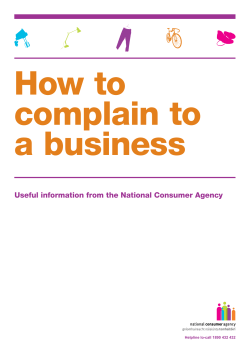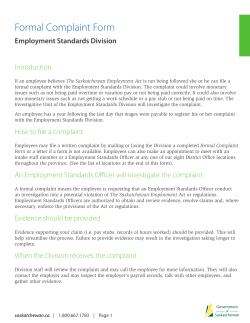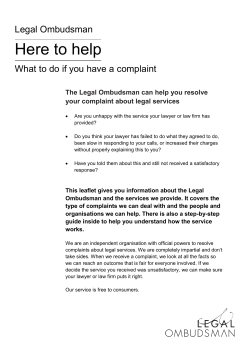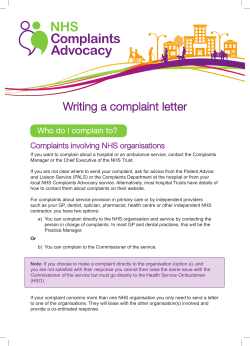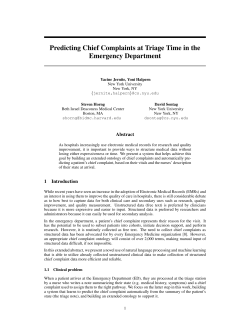
CHAPTER 11 FORMAL COMPLAINT INTRODUCTION
C H A P T E R 1 1 : F O R M A L C O M P L A I N T CHAPTER 11 FORMAL COMPLAINT INTRODUCTION Formal complaint is one of the methods parents or others have to resolve special education disagreements with the school district. Although most differences are successfully resolved at the local level, three state processes are available to parents, if they are at impasse with the school district: Formal complaint, Mediation (Chapter 10), and Due process hearing (Chapter 12). Formal complaint is one of the parent rights (procedural safeguards, see Chapter 1) afforded under Federal and State regulations (K.A.R. 91-40-51; 34 C.F.R. 300.151). The Kansas State Department of Education (KSDE) is mandated to make available an opportunity for individuals or organizations to file formal complaints against the school. At the end of the chapter are a flow chart that illustrates the steps in the process, and a timeline showing the times and responsible parties for the required steps. For information about the formal complaint process, contact Families Together (800-264-6343), Kansas Disability Rights Center (877-776-1541), or Special Education Services at the KSDE (800-203-9462). The Formal Complaint form may be found at http://www.ksde.org/Default.aspx?tabid=3456. This chapter outlines the steps involved in the formal complaint process: A. B. C. D. E. Filing a Formal Complaint Investigating the Complaint Following Up on the Complaint Appealing the Decision Sanctions by the State Board of Education A. FILING A FORMAL COMPLAINT Any individual or organization may file a formal complaint if they believe that the school district is not complying with Federal or State laws or regulations relating to special education. The formal complaint must be for a situation that occurred during the past year. The formal complaint must be in writing and signed by the person or organization making the complaint. The complaint must state that the school is not complying with the requirements of IDEA, the State Special Education for Exceptional Children Act, or the corresponding Federal or State regulations and give the facts upon which the statement is based. When the complaint involves a specific child, the complaint must also include the following: The child’s name and address of residence, or other contact information if the child is a homeless child or youth; the name of the school the child is attending; a description of the problem involving the child; and a proposed resolution to the problem, if a possible resolution is known and available to the complainant. The party filing the complaint must forward a copy of the complaint to the school against which the allegations are made at the same time the complaint is filed with the commissioner of education. Kansas State Department of Education Kansas Special Education Services Process Handbook CHAPTER 11 FORMAL COMPLAINT 179 The parent of any child with an exceptionality (disabilities and giftedness) including eligible students receiving services in public schools, private schools and other educational settings are entitled to file a formal complaint if they believe appropriate legal procedures have not been followed or implemented. If a formal complaint is received that is part of a due process hearing, or the complaint contains multiple issues of which one or more are part of such a hearing, the State must set aside the State complaint, or any part of the complaint that is being addressed in the due process hearing until the hearing is over. Any issue in the State complaint that is not a part of the due process hearing must be resolved through the State process. Forms for filing a formal complaint may be found at http://www.ksde.org/Default.aspx?tabid=3456. This form may be faxed to the Team Leader, Special Education Services Team (785-296-6715), but the original must then be mailed to the Kansas State Department of Education, Special Education Services, 120 SE Tenth Avenue, Topeka, KS 66612. Additionally, a copy of this completed form must be sent to the school district against which the complaint is filed. B. INVESTIGATING THE COMPLAINT The Special Education Services Team at the Kansas State Department of Education must resolve a formal complaint within 30 calendar days from the date the complaint is received in the office, unless exceptional circumstances exist. When a formal complaint is received a letter acknowledging receipt of the formal complaint is sent to the person making the complaint, the special education director, and the superintendent. A copy of the formal complaint is attached with the letter to the special education director and the superintendent. The complaint investigator will contact the person making the complaint and the special education director to clarify the issue(s), review all relevant records and documents, and determine whether or not the facts stated in the complaint are correct and, if so, whether they substantiate a violation of the requirements of special education laws or regulations. KSDE’s working definition for exceptional circumstance extensions of formal complaint timelines: An exceptional circumstance arises when an event or series of events, beyond the control of the agency or the investigator, reasonably justifies an extension of time in which to complete an investigation. The investigator will contact the agency against which the complaint is filed to allow the agency to respond to the complaint with facts and information supporting its position, offer a proposal to resolve the complaint, or offer to engage in mediation to resolve the complaint. Both parties can provide additional information to the investigator that is relevant to the issue. Neither party can introduce a new issue during the investigation. After the investigation, the complaint investigator writes a report of the findings addressing each of the allegations in the complaint and which contains: (a) findings of fact and conclusions; (b) the reasons for KSDE’s final decision; and (c) any corrective action or actions that are required including the time period within which each action is to be taken. The report is to be sent to the parties within 30 days of the receipt of the complaint unless the parties agree to extend the 30 day timeline to engage in mediation. C. FOLLOW UP ON THE COMPLAINT If the report from the formal complaint requires corrective actions, the school shall, within 10 calendar days of the date of the report, submit one of the following to the KSDE Special Education Services Team: 1. 2. 3. Documentation to verify it accepts the corrective action(s) in the report, if any; A written request for more time to complete the required action(s), with justification for this request; or A written notice of appeal. If the district asks for more time to complete one or more of the required corrective actions, a review committee of at least three people at KSDE are appointed by the Commissioner to review the request and the justification for an extension. The committee shall make a decision regarding the request within five business days of the date 180 CHAPTER 11 FORMAL COMPLAINT Kansas State Department of Education Kansas Special Education Services Process Handbook that the request was received, and their decision is final. If the school fails to respond to a report within the time allowed sanctions may be invoked. When the corrective actions are completed by the school, the Special Education Services Team sends a notice of completion to the school with a copy to the person making the complaint. At that point, the complaint file is closed. D. APPEALING THE DECISION After the person making the complaint and the school receive the written report of findings, each has 10 calendar days from the date of the report to file an appeal. Each notice of appeal shall provide a detailed statement of the basis for alleging that the report is incorrect. The following steps are followed for appeals: 1. 2. 3. An appeal committee of at least three KSDE members shall be appointed by the Commissioner to review the report and to consider information provided by the school, the complainant, or others. The hearing process, including any hearing conducted by the appeal committee, shall be completed within 15 days from the date of receipt of the appeal notice. A decision shall be rendered within five days after the appeal process is completed, unless the appeal committee determines that exceptional circumstances exist. Then the decision shall be rendered as soon as possible. If the person making the complaint or the school does not appeal the decision and no corrective actions are required, the complaint file is closed. E. SANCTIONS BY THE STATE BOARD OF EDUCATION The Kansas State Board of Education has sanctions available if corrective action required by a formal complaint investigation is not implemented. Additionally, if an appeal committee affirms a compliance report that requires corrective action by a school, that district must initiate the required corrective action immediately. If after five days, no required corrective action has been initiated, the school district will be notified of the action that will be taken to assure compliance as determined by the department. This action may include any of the following: the issuance of an accreditation deficiency advisement; the withholding of state or federal funds otherwise available to the agency; the award of monetary reimbursement to the complainant; or any combination of the above actions. Kansas State Department of Education Kansas Special Education Services Process Handbook CHAPTER 11 FORMAL COMPLAINT 181 K.A.R. 91-40-51. Filing complaints with the state department of education. (a) Any person or organization may file a written, signed complaint alleging that an agency has violated a state or federal special education law or regulation. Also, a prevailing party in a due process hearing may file a complaint alleging that the other party has failed to implement the hearing decision. The complaint shall include the following information: (1) A statement that the agency has violated a requirement of state or federal special education laws or regulations; (2) the facts on which the statement is based; (3) the signature of and contact information for the complainant; and (4) if the complaint involves a specific child, the following information: (A) The child's name and address of residence, or other contact information if the child is a homeless child or youth; (B) the name of the school the child is attending; (C) a description of the problem involving the child; and (D) a proposed resolution to the problem, if a possible resolution is known and available to the complainant. (b) (1) The complaint shall allege a violation that occurred not more than one year before the date the complaint is received and shall be filed with the commissioner of education. (2) The party filing the complaint shall forward a copy of the complaint to the agency against which the allegations are made at the same time the complaint is filed with the commissioner of education. (c) Upon receipt of a complaint, an investigation shall be initiated. At a minimum, each investigation shall include the following: (1) A discussion with the complainant during which additional information may be gathered and specific allegations of noncompliance identified, verified, and recorded; (2) contact with the agency against which the complaint is filed to allow the agency to respond to the complaint with facts and information supporting its position, offer a proposal to resolve the complaint, or offer to engage in mediation to resolve the complaint; and (3) a written report of findings of fact and conclusions, including reasons for the decision, and any corrective action or actions that are required, including the time period within which each action is to be taken. Unless the parent and the agency agree to engage in mediation, this report shall be sent to the parties within 30 days of the receipt of the complaint. If the parties mediate but fail to resolve the issues, the report shall be sent 30 days after the department received notice that mediation has failed. (d) An on-site investigation may be conducted before issuing a report. (e) (1) If a report requires corrective action by an agency, that agency, within 10 days of the date of the report, shall submit to the state director of special education one of the following: (A) Documentation to verify acceptance of the corrective action or actions specified in the report; (B) a written request for an extension of time within which to complete one or more of the corrective actions specified in the report, together with justification for the request; or (C) a written notice of appeal. Each appeal shall be made in accordance with subsection (f). (2) If an agency files a request for an extension of time within which to complete one or more corrective actions required in a report, a review committee of at least three department of education members shall be appointed by the commissioner to review the request and the offered justification for the extension of time. A decision on the request shall be made by the committee within five business days of the date the request was received. The decision of the review committee shall be final. (3) If a local education agency fails to respond to a report within the time allowed, the sanctions listed in paragraph (f) (2) may be invoked. (f) Appeals.(1) Any agency or complainant may appeal any of the findings or conclusions of a compliance report prepared by the special education section of the department by filing a written notice of appeal with the state commissioner of education. Each notice shall be filed within 10 days from the date of the report. Each notice shall provide a detailed statement of the basis for alleging that the report is incorrect. Upon receiving an appeal, an appeal committee of at least three department of education members shall be appointed by the commissioner to review the report and to consider the information provided by the local education agency, the complainant, or others. The appeal process, including any hearing conducted by the appeal committee, shall be completed within 15 days from the date of receipt of the notice of appeal, and a decision shall be rendered within five days after the appeal process is completed unless the appeal committee determines that exceptional circumstances exist with respect to the particular complaint. In this event, the decision shall be rendered as soon as possible by the appeal committee. (2) If an appeal committee affirms a compliance report that requires corrective action by an agency, that agency shall initiate the required corrective action immediately. If, after five days, no required corrective action has been initiated, the agency shall be notified of the action that will be taken to assure compliance as determined by the department. This action may include any of the following: (A) The issuance of an accreditation deficiency advisement; (B) the withholding of state or federal funds otherwise available to the agency; (C) the award of monetary reimbursement to the complainant; or (D) any combination of the actions specified in paragraph (f)(2). (g) (1) If a complaint is received that is also the subject of a due process hearing or that contains multiple issues of which one or more are part of the due process hearing, the complaint or the issues that are part of the due process hearing shall be set aside until conclusion of the hearing. (2) If an issue that has previously been decided in a due process hearing involving the same parties is raised in a complaint, the due process hearing decision shall be binding on that issue and the complainant informed of this fact. 182 CHAPTER 11 FORMAL COMPLAINT Kansas State Department of Education Kansas Special Education Services Process Handbook FORMAL COMPLAINT PROCEDURE A complaint alleging a violation of special education laws or regulations is received by the Kansas State Department of Education (KSDE) A courtesy letter acknowledging receipt is sent to complainant and local education agency (LEA) Investigation by KSDE. Interview with the complainant and LEA (may or may not include onsite visit) Written Report of Findings Within 30 Days Contains corrective actions if a violation is substantiated and timelines for completion, mailed to complainant and LEA IF IF IF corrective actions are accepted and completed by the LEA, then notice of completion is given to the LEA and the complainant no appeal and no corrective actions Appealed Commissioner of Education Either party may appeal within 10 days from the date of the report Review completed by 3 KSDE staff within 15 days from the date the appeal is received Report issued in 5 days Report Complete Complaint File Closed Kansas State Department of Education Kansas Special Education Services Process Handbook CHAPTER 11 FORMAL COMPLAINT 183 FORMAL COMPLAINT TIMELINE Timeline st 1 Day Responsible Party Complaint Action Mail or deliver a written, signed complaint form requesting a formal complaint investigation to the Formal Complaint Investigator for the Student Support Services Team of the Kansas State Department of Education. th KSDE Mail letters to the complainant and special education administrator acknowledging receipt of the complaint. Mail copies of the letters to complainant, special education administrator, and school district superintendent. th KSDE Contact complainant and special education administrator to clarify issues in complaint letter, to solicit relevant information and documents, and to schedule a date and time for the on-site investigation, if necessary. th KSDE Conduct investigation. Review and request copies of student records and IEPs. Interview complainant. Interview special education administrator and other school personnel. th KSDE Prepare written report of findings and corrective actions(s) which may be required and the time period within which each corrective action is to be taken. th KSDE Mail written report of findings and corrective action(s) to complainant and special education administrator. Mail copy of report to school district superintendent. 10 Day 15 Day 20 Day 25 Day 30 Day Review LEA documentation of implementation of corrective action(s) contained in written report; or th 40 Day (unless Extension Granted) KSDE Review LEA request for an extension of time within which to complete corrective action(s); or Review LEA written notice of appeal of written report. th 40 Day Complainant or LEA Within 10 calendar days from the date the written report was sent – Send a notice of appeal to the State Commissioner of Education. st 41 Day (unless Extension Granted) 184 KSDE CHAPTER 11 FORMAL COMPLAINT Pursue sanctions if LEA fails to respond to a written report within the time allowed Kansas State Department of Education Kansas Special Education Services Process Handbook QUESTIONS AND ANSWERS ABOUT FORMAL COMPLAINT 1. Who is the contact to file a formal complaint? Parents, individuals, or organizations who believe that the school district or cooperative has violated Federal or State laws or Federal or State regulations relating to special education should contact the KSDE, Special Education Services Team. Phone: 785-296-5478, or 800-203-9462 Fax: 785-296-6715 Address: Kansas State Dept. of Education, 120 SE Tenth Avenue, Topeka, KS 66612 Homepage: www.ksde.org Email: mward@ksde.org 2. How long does the investigation of a complaint take? The complaint must be investigated and a report written with the findings of the complaint investigator within 30 calendar days of the date the complaint was received at the Kansas State Department of Education. Upon completion of a written report, the school or the complainant has 10 calendar days for the school to comply with the corrective action plan, or file an appeal. 3. May parents of children in private schools, who are receiving special education services, file a formal complaint? Yes. Formal complaint is available to parents (or another individual or organization), even if services provided in a private school are on a Services Plan, and not an IEP. 4. May parents of children who are gifted file a formal complaint? Yes. The formal complaint process is available to parents of children who are disabled or gifted. In addition, another individual or organization may file a formal complaint. 5. May parents of young children file a formal complaint? Yes. For young children from birth to age 3, formal complaint is available through the Kansas Department of Health and Environment, 785-296-6135 or 800-332-6262. For young children who are eligible beginning at age 3, formal complaint is available to parents of children who are disabled or developmentally delayed through KSDE, 785-296-5478, or 800-203-9462. 6. Who can file a formal complaint? Basically, anyone who has knowledge that the proper legal procedures were not followed or implemented may file a formal complaint with KSDE. This would include, but is not limited to, parents, parent advocates, the student if age 18, grandparents, foster parents, an individual, or an organization. In addition, it may be that in unusual circumstances, a member of the school team could file a formal complaint. 7. Does filing a formal complaint waive the parents' right to file for a due process hearing? No. Parents may file a formal complaint before, at the same time, or after filing for a due process hearing. However, if the issue is the same, the formal complaint investigation will be suspended until due process is resolved. Kansas State Department of Education Kansas Special Education Services Process Handbook CHAPTER 11 FORMAL COMPLAINT 185 186 CHAPTER 11 FORMAL COMPLAINT Kansas State Department of Education Kansas Special Education Services Process Handbook
© Copyright 2025
